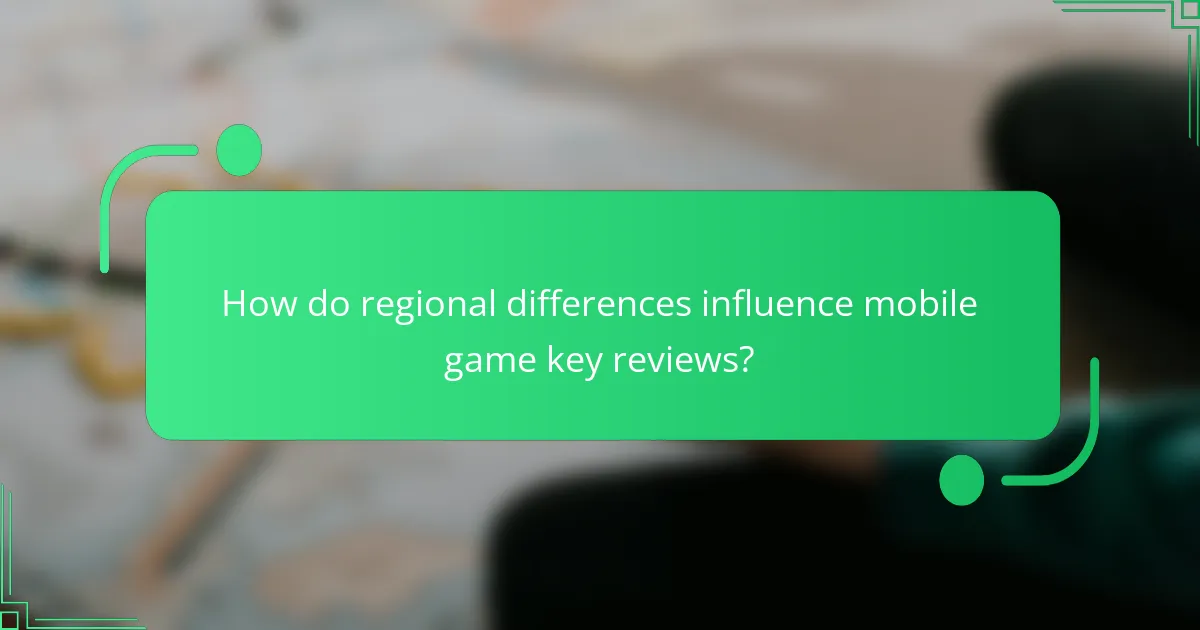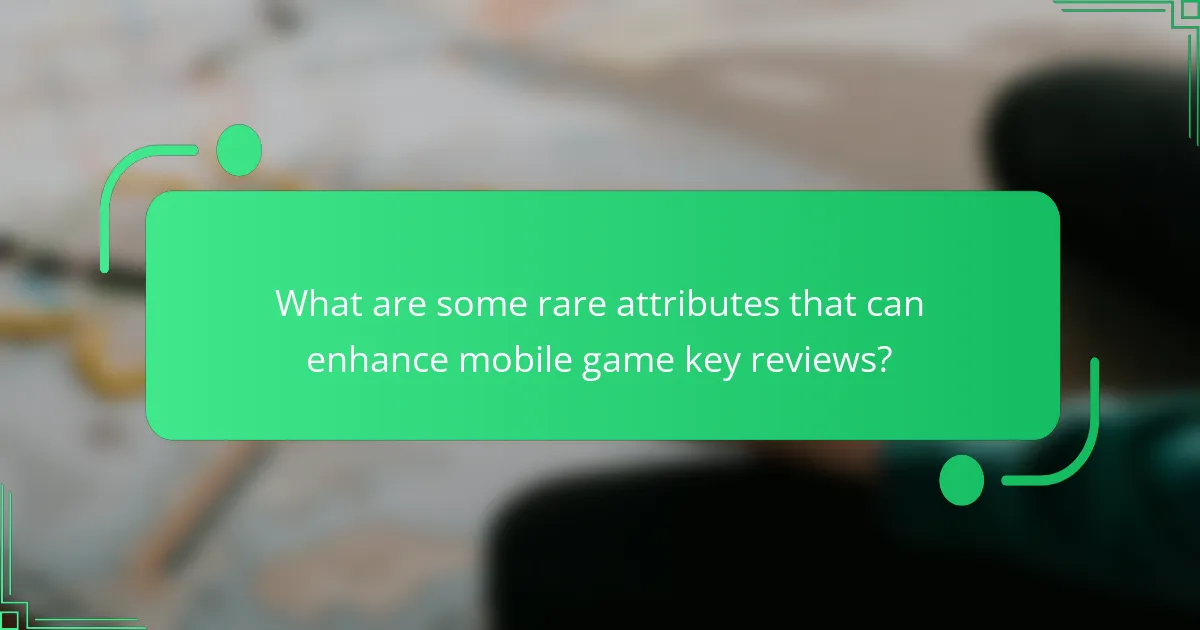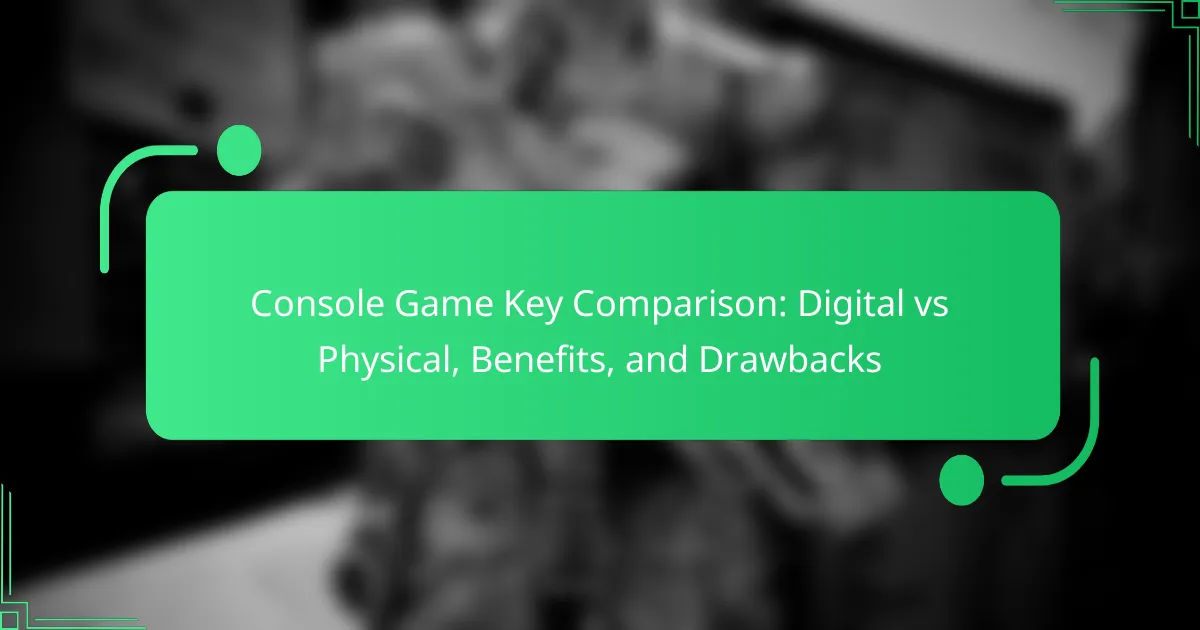Mobile game key reviews provide critical insights into the gaming experience, helping players make informed decisions. This article analyses top platforms like Metacritic, IGN, and Steam, highlighting their unique attributes and user feedback mechanisms. It also examines regional differences in user preferences and discusses the impact of exclusive features and rare attributes on player satisfaction. Lastly, it emphasises the importance of detailed analysis and user engagement in enhancing review quality.

Which platforms offer the best mobile game key reviews?
Several platforms provide reliable mobile game key reviews, including Metacritic, IGN, and Steam. These platforms aggregate user feedback and professional critiques, offering comprehensive insights. Metacritic compiles scores from various critics, while IGN provides in-depth reviews and gameplay analysis. Steam features user-generated reviews that reflect player experiences and satisfaction. Each platform has unique attributes, such as Metacritic’s weighted scoring system and Steam’s community engagement, enhancing the review process.
What are the key features of leading mobile game key review platforms?
Leading mobile game key review platforms feature user-friendly interfaces, comprehensive review systems, and community engagement tools. They prioritise transparency, allowing users to compare key metrics like pricing and availability. Additionally, many platforms offer user-generated content, enhancing trust through authentic feedback. Advanced filtering options help users find specific game keys efficiently, catering to diverse preferences.
How do user interfaces impact user experience on these platforms?
User interfaces significantly influence user experience on mobile gaming platforms by enhancing engagement and accessibility. A well-designed interface promotes intuitive navigation, leading to higher satisfaction. For instance, responsive touch controls and clear visual cues improve gameplay fluidity. Additionally, personalisation options, such as customisable settings, cater to diverse player preferences, enriching the overall experience. User feedback often highlights the importance of these interface elements in retaining players and fostering loyalty.
Why is user feedback crucial for mobile game key reviews?
User feedback is essential for mobile game key reviews as it directly influences game quality and user engagement. Feedback highlights areas for improvement, ensuring developers address player concerns. It also helps establish credibility on review platforms, attracting new users. Additionally, user ratings can drive updates and enhancements, fostering a community around the game.

What common attributes do mobile game keys share across platforms?
Mobile game keys across platforms commonly share attributes such as ease of access, compatibility, and user feedback mechanisms. These keys typically offer streamlined activation processes, allowing users to quickly unlock content. Compatibility ensures that keys function across various devices and operating systems. User feedback mechanisms enable players to report issues or provide suggestions, enhancing overall user experience.
How do pricing models vary between different platforms?
Pricing models for mobile game keys vary significantly across platforms, impacting user choice and accessibility. Some platforms use a subscription model, charging users a recurring fee for access to a library of games. Others adopt a pay-per-key approach, where users purchase individual keys for each game. Additionally, certain platforms offer tiered pricing based on usage, providing discounts for bulk purchases.
User feedback often highlights differences in value perception, with some platforms praised for competitive pricing and others criticised for hidden fees. The unique attribute of each platform’s pricing strategy can influence user loyalty and satisfaction. As a result, understanding these variations is crucial for gamers seeking the best deals.
What types of user engagement metrics are most relevant?
User engagement metrics for mobile games include retention rate, daily active users, session length, and user feedback scores. These metrics help assess player engagement and satisfaction. Retention rate indicates how well a game keeps players over time. Daily active users measure the game’s reach and popularity. Session length reveals how long players engage with the game in each visit. User feedback scores provide qualitative insights into player experiences, highlighting areas for improvement.
Which platforms have the most comprehensive review systems?
Platforms with the most comprehensive review systems include Steam, Google Play, and the App Store. These platforms feature extensive user feedback mechanisms, allowing players to share detailed experiences and ratings.
Steam offers a robust review system that includes user-generated content, while Google Play and the App Store provide streamlined rating systems with options for detailed comments. Each platform emphasises transparency and user engagement, enhancing the decision-making process for potential gamers.
Steam | User reviews, community feedback | High engagement
Google Play | Star ratings, written reviews | User-friendly interface
App Store | Ratings, detailed feedback | Curated content

How do regional differences influence mobile game key reviews?
Regional differences significantly impact mobile game key reviews by influencing user preferences and feedback. Cultural context shapes the gaming experience, leading to varied evaluations across regions. For example, a game’s narrative may resonate differently in Asia compared to Europe, affecting ratings and comments. Additionally, local market trends dictate which features users value most, such as multiplayer options or in-game purchases. Understanding these regional nuances is crucial for developers aiming to enhance user satisfaction and optimise their games for diverse audiences.
What are the cultural preferences affecting user feedback in different regions?
Cultural preferences significantly influence user feedback on mobile games across regions. Factors such as gaming habits, social norms, and local trends shape user expectations and experiences. For example, in Asia, competitive gaming is highly valued, leading to a focus on multiplayer features. In contrast, Western users may prefer narrative-driven experiences. Understanding these cultural nuances helps developers tailor their games for diverse audiences, enhancing user satisfaction and engagement.
How do language barriers impact the review process?
Language barriers significantly hinder the review process by limiting user feedback and platform accessibility. Users who speak different languages may struggle to understand game mechanics or provide constructive reviews. This can lead to miscommunication and skewed perceptions of game quality. Additionally, platforms may lack diverse language support, further isolating non-English speaking users. As a result, valuable insights from a broader audience are often lost, impacting developers’ ability to improve their games effectively.

What unique attributes can be found in specific mobile game keys?
Unique attributes in mobile game keys include platform compatibility, exclusive in-game items, and user customisation options. These characteristics enhance the gaming experience and can differentiate keys across various platforms. For instance, some keys may unlock unique skins or characters not available through standard gameplay. Additionally, certain mobile game keys may offer cross-platform functionality, allowing users to access their games on different devices seamlessly.
Which platforms offer exclusive game keys and why are they significant?
Several platforms offer exclusive game keys, including Epic Games Store, Steam, and Humble Bundle. These platforms are significant because they provide unique discounts, exclusive titles, and promotional offers that enhance user engagement. Exclusive game keys often include benefits like early access to games or bundled content that are not available on other platforms. This exclusivity can drive user loyalty and increase sales for both the platform and game developers.
How do promotional events shape user reviews and engagement?
Promotional events significantly enhance user reviews and engagement for mobile games. These events create excitement and encourage players to participate actively, leading to increased feedback.
Limited-time offers and exclusive in-game items motivate players to share their experiences online. As a result, user reviews often reflect heightened enthusiasm during promotional periods.
Additionally, promotional events can introduce new features that users evaluate, influencing their overall perception of the game. This dynamic interaction fosters a community around the mobile game, enhancing long-term engagement.
In summary, promotional events drive user participation, leading to more frequent and enthusiastic reviews, ultimately shaping the game’s reputation on key platforms.

What are some rare attributes that can enhance mobile game key reviews?
Rare attributes that enhance mobile game key reviews include cross-platform compatibility, integration of augmented reality, innovative monetisation strategies, community-driven content updates, advanced AI-driven gameplay mechanics, and unique narrative structures. These traits provide distinct user experiences and influence overall player satisfaction.
What innovative review methods are emerging in the mobile gaming industry?
Emerging innovative review methods in the mobile gaming industry include user-generated content analysis, AI-driven sentiment analysis, and interactive review formats. These methods enhance the understanding of user experiences and preferences.
User-generated content analysis leverages reviews and comments from players to identify trends and common issues. AI-driven sentiment analysis utilises algorithms to gauge player emotions and satisfaction levels from written feedback. Interactive review formats engage users through polls and surveys, providing real-time insights into player opinions.
These methods collectively improve the quality of reviews, ensuring they reflect actual player experiences and preferences.
How do user-generated content and social proof affect reviews?
User-generated content and social proof significantly enhance the credibility of mobile game key reviews. Positive user feedback fosters trust among potential buyers, influencing their purchasing decisions. Platforms showcasing authentic reviews often experience higher conversion rates. User-generated content, such as gameplay videos or testimonials, provides valuable insights into game quality and user experience. This transparency helps potential players make informed choices, ultimately shaping the mobile gaming landscape.

What practical strategies can enhance the quality of mobile game key reviews?
To enhance the quality of mobile game key reviews, focus on user engagement, detailed analysis, and constructive feedback. Prioritise platforms that encourage user interaction, such as forums and social media. Analyse user feedback for common themes and issues, ensuring reviews address gameplay mechanics, graphics, and user experience. Encourage reviewers to provide specific examples and avoid vague statements, as this adds credibility. Regularly update reviews to reflect changes in the game and user sentiment, maintaining relevance and accuracy.
How can users effectively evaluate the credibility of reviews?
Users can evaluate the credibility of reviews by checking the reviewer’s history, looking for verified purchases, and assessing the review’s detail. Focus on platforms that display user ratings and feedback patterns. Analyse the consistency of reviews across different platforms to identify potential biases. Consider the date of the reviews, as recent feedback is more relevant to current game performance.
What common mistakes should users avoid when reading reviews?
Users should avoid relying solely on one review, ignoring the date of the review, and not considering the reviewer’s credibility. Reading multiple reviews provides a balanced perspective. Outdated reviews may not reflect current game quality or features. Evaluating the reviewer’s experience with mobile games ensures relevant insights.
Which best practices can improve the review process for platforms and users alike?
Implementing best practices can significantly enhance the review process for mobile game platforms and users. First, establish clear guidelines for reviewers to ensure consistency and reliability in evaluations. Second, encourage user feedback through structured surveys that capture specific aspects of gameplay, graphics, and user experience. Third, utilise data analytics to identify trends in reviews, helping platforms respond to common issues effectively. Lastly, foster a community-driven approach by allowing users to upvote helpful reviews, which can guide new players in their decision-making.



